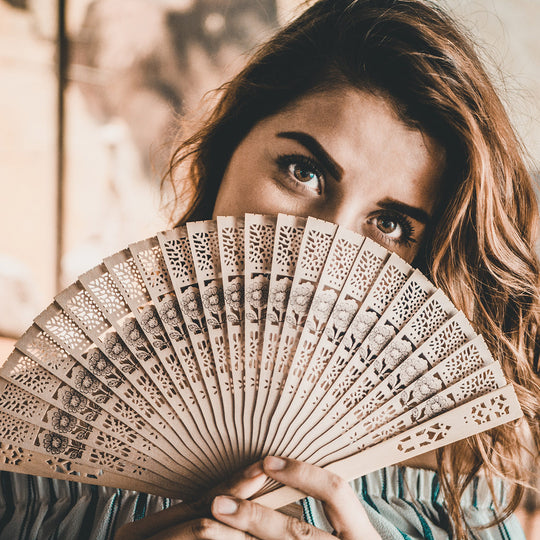I was an equal opportunity flasher. My hot flashes did not discriminate. This means I did not know what triggered them, when they would appear, or how long they’d last. There could be snow on the ground but my internal body thermometer functioned as if it had not gotten the message that it was 35 degrees outside. There were similar times while lying on the beach in the shade or skiing in Colorado that I experienced a tsunami hot flash that caused me to believe it would never end.
Some women identify sugar, wine, or warm temperatures as their triggers. At the height of my flashing life, I felt like I was a victim of the unpredictability of my hormonal imbalance. Having never given much thought to my hormones, except during pregnancy, I didn’t understand how to address this problem.
I was not consciously experiencing difficulty coping with my life. I did not have PMS. Nor was I bloating after my meals. More than anything, I had trouble sleeping and my body temperature was in flux. My very unpredictable hot flashes began at my toes, crawled slowly up my legs, inched across my stomach, setting my breasts on fire before burning my neck, cheeks, and skull and erupting in sweat in my hairline.
Will I Know When Hot Flashes Generally Begin?
Medical professionals define hot flashes as “a sensation of heat that begins in the head and neck regions.” Except this definition did not accurately reflect how my flashes would begin. And as I inferred, while research suggests hot flashes can be brought on by spicy foods, tight clothing, stress, wine, hot weather, smoking, coffee, sugar, and heat, I was never able to identify any one of these as my recurring trigger.
Can I Make Sense Of My Hot Flashes In My Friend’s Experiences?
I looked for an understanding in the experiences of my friends. One said she’d only had the bedtime version of hot flashes, night sweats. She’d wake up in the middle of the night, so thoroughly drenched that she’d have to change her night clothes and pillowcases. All she could offer to my broader hot flash inquiry was gratitude that she’d been spared the embarrassment many of us face when we publicly experience hot flashes.
A second friend described a date night when she was flashing extremely hard as typical of the type of flasher she is. Sweat dripped down her legs and back. It was so extreme she had to excuse herself and go to the ladies' room. I laughed when she said the back of her dress looked as though she’d just finished thirty minutes of cardio. But to make matters worse, this was a first date. I noted that she said her head was on fire first, then her arms and the back of her legs.
This is consistent with the medical definition of hot flashes above.
One last friend said she only had hot flashes for a three month period. But during those three months, hot flashes came every half hour. Her doctor didn't believe she was having hot flashes because she was still having her period (I’ll bet her doctor was a man). A lab test revealed her hormone levels were dropping extremely fast. Weirdly, after that initial three month period, she only had flashes if she suddenly became excited (in either a good or bad way).
Does Knowing My Triggers Help Me Understand What Kind of Flasher I Am?
The Mayo Clinic says, “The cause of hot flashes isn't known, but it's likely related to several factors. These include changes in reproductive hormones and in your body's thermostat (hypothalamus), which becomes more sensitive to slight changes in body temperature.”
It is only in retrospect that I have come to learn hormones are the body’s messengers. According to Natasha Turner, a Naturopathic Doctor, and author of The Hormone Diet, “hormones control everything from our reproductive functions to our mood, sleep, appearance and almost every other aspect of our daily life.” If I’d known this, I might have asked my doctor more appropriate questions rather than suffering in silence.
Because of my family history I leaned more toward plant medicine with teas like black cohosh and licorice that are a part of traditional history. I did not seriously consider replacement therapy as an option because of a family history of breast cancer. I knew a few people who’d either been offered replacement therapy by their physicians or who had made this decision. Culturally, I understood hot flashes were part of a change of life woman-thing.
I do not recall experiencing significant relief drinking these teas, however. My silent acceptance of hot flashes became a part of an underlying imbalance in my health that began with my hormones. Even with some distance today, I know little about my hormonal health because general practitioners do not incorporate this knowledge into their treatments.
So now you know what kind of flasher I was. Like a lot of women I understood hot flashes to be a common symptom we experience leading up to, and during the early stages of the menopausal transition. But I now know not everyone will develop hot flashes.
NOTICE: KINDRA DOES NOT PROVIDE MEDICAL OR HEALTH CARE ADVICE. OUR EMPLOYEES AND OTHER REPRESENTATIVES ARE NOT PHYSICIANS OR HEALTH CARE CLINICIANS. YOU SHOULD CONSULT YOUR PERSONAL PHYSICIAN FOR ANY MEDICAL AND/OR OTHER HEALTH CARE ADVICE BEFORE ACTING ON ANY INFORMATION PROVIDED BY KINDRA OR ANY OTHER SOURCE.
Continue the Conversation
Leave a Reply
Tags: About Menopause Anxious balanced diet best advice Dry Skin Fatigue Foggy & Unfocused hot flashes Managing my Hormones menopause Mental Well-Being Moody & Irritable Night Sweats Personal Stories Physical Well-Being Sad Stressed Trouble Sleeping














Patricia, I recently decided to carry around a small notebook with me…EVERYWHERE. I will document every time I have a hot flash and what precipitated it. Hopefully this will help me to find my hot flash triggers. BTW, for the past few weeks, my hot flashes have started in the center of nose, radiating outward across my face, and then my body goes up in flames.
— Valerie
Thanks for reading Valerie. Isn’t it interesting that where yours begin was almost where myine ended. I think knowing your triggers “may” help.
— Patricia A. Patton
I always appreciate what others can share on menopause. Its helpful to know others are also dealing with this. I found myself wondering why my symptoms vary from day to day, although I’m glad to say I’ve never experienced moodiness, and remember wondering if it had anything to do with what I eat, like spicy food and caffeine. I never guessed salt though.
— Ellen
I do know that mine are cyclical. Some times they are really bad and last a lifetime ( ha ha not really), then there are the shorter ones that are only about 20 seconds. But i will say that all of mine make sweat drip down my back and ears turn bright red along with my face. My normal which has been my whole life i am cold. So with it being summer all my patients comment that i have a zip up hoodie on. I have goose bumps most of the time until i have a hot flash! Then of course the goose bumps come back because I’m sweating! It’s a vicious cycle.
— Kathleen